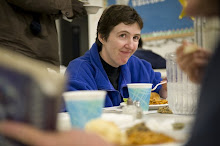Go.
The following is a talk I gave at St. John the Baptist Episcopal Church in Lodi, CA this morning. They are sending a group to New Orleans in June. The rector, an old friend, asked me to speak of my experiences there.
I went to New Orleans because my friend Michael invited me. What I found there changed me forever. I met God, and God’s people, there.
I went with three other seminary students, over our Spring Break, during the last week of March. We worked with a local grassroots nonprofit. Michael gutted houses, which is still the most needed physical task there, as taking people’s houses apart from the inside, down to the studs, preserves people’s property rights should they want to return. Judy, Vivian, and I divided our time between a women’s shelter and a distribution center, in the 9th Ward. We met people whose stories will stay with us forever.
We met Joanne, a cargo worker at the Port of New Orleans. She was staying in a three-bedroom house with 16 other women. Her second home since Katrina was condemned, two weeks before I met her. The storm pushed sea water underneath the city. 19 months later, the water is still underground. The water corrodes the pipes, ultimately destroying the plumbing. The problem is too extensive, and costly, to fix. Joanne has been all over the world. New Orleans is her favorite place. She loves the city—but she is finding it impossible to live there.
Joanne led us to Bill, the rector of St. Anna’s Episcopal Church. Joanne had told us that she was drunk for a year after Katrina, and that this church had led her back to God. We attended Eucharist on a Wednesday night, drawn both by her witness and by the Mission to Musicians benefit potluck they host every week. Bill said that he, along with most other New Orleanians, simmered with anger underneath the surface. But when I asked him what he would have me take back to California, the first things he said were peace and hope.
We took a day to play, and had lunch in the French Quarter at the New Orleans School of Cooking. When they found out what we’d been doing, wealthy locals out touristing thanked us just as whole-heartedly as the residents of the 9th Ward had, just for noticing them. The chef thanked the out-of-town tourists as deeply as he thanked us. It’s important that you go and witness to the devastation in that city. It is also important to go and have fun there. There’s a lot to make you think, in New Orleans. There’s also a lot to love there. The Quarter is a really fun place. Tourism has always been important, and that’s even more true now. Putting money into their economy helps them survive, and it will help them rebuild.
I thought I knew what poverty was. I didn’t. No amount of reading, or seeing photographs, could have prepared me for block after block after block after block of empty, flood-damaged houses. Nothing could have prepared me for the shock of standing in someone’s kitchen, and coming to really understand the geographic, economic, and political causes of this flood that took six weeks to pump dry. Nothing could have prepared me for meeting so many people who were so poor and yet so faithful, who lived with their souls almost visible. They were so grateful to be seen, to be spoken to, to be helped, to be remembered. We were a sign of hope to them; a sign of God’s presence. They were a sign of God’s presence to us.
Going to New Orleans changed me forever. I have a new commitment to mission, a new understanding of the political and economic forces in my own country, and a new empathy for people in all third-world situations. I know that I’ll go back; I’m already planning to. I urge you to go, to help out, to meet the people, to experience the place. I’ll be at the back table. I have more stories, and I have pictures. Please come talk to me.
Thank you.





2 comments:
Thanx for coming.
so many people who were so poor and yet so faithful, who lived with their souls almost visible.
This speaks volumes to me.
Blessings, Kirsten.
Post a Comment